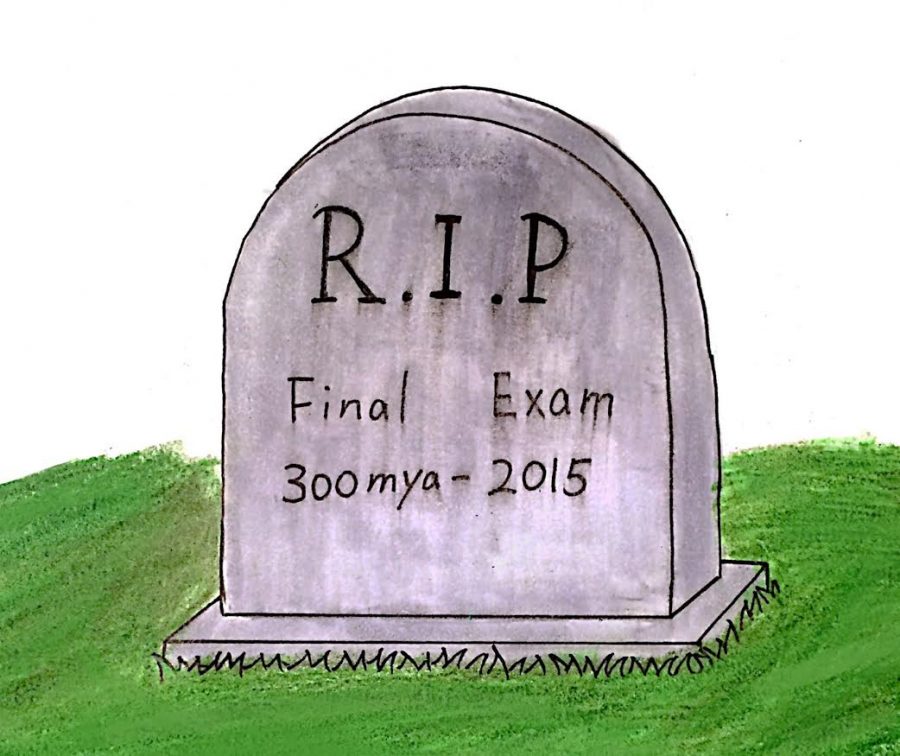Montgomery County Public Schools has made the difficult decision to eliminate final exams in middle schools and high schools. This decision comes as one of the first of its kind, possibly setting an example for other schools across the country. Starting in the 2016-2017 school year, the county plans to completely eliminate all final exams.
Final exams tend to cause a lot of stress for both the students and county officials. While MCPS students do relatively well on state and national exams, the failing rate for some county final exams is alarming. According to the Washington Post, 50 percent to 60 percent of high school students failed their math finals in 2013. These statistics attracted a lot of negative attention from the parents, students and the general public.
Concerns about over-testing have increased recently, especially with the introduction of the new national Partnership for Assessment of Readiness for College and Careers exam (PARCC). The state has made it clear that the PARCC is not going anywhere.
In an attempt to decrease the burden on students, MCPS gathered feedback from various sources. According to the MCPS FAQ page about the upcoming changes to final exams, MCPS has developed a plan to “Eliminate two-hour middle school exams in middle school courses beginning in 2015-16”, as well as “Eliminate two-hour high school exams in PARCC and HSA courses beginning second semester 2015-16, similar to current practice with AP/IB courses”
This would mean that high school students would be exempt only from final exams this year, and would still be required to take midterm exams. Furthermore, the only exams that are being removed this year are those exams with the same overlapping subjects as the HSA (English 10, Algebra, Government, Biology). MCPS plans to eliminate all high school exams during the 2016-17 school year.
Earlier in March, Interim Superintendent Larry Bowers brought forth the option of eliminating the traditional, two-hour-long finals, and replacing them with smaller, marking period assessments that will be distributed throughout the year during normal class periods. In July, the Board unanimously embraced this option. As part of the plan, MCPS will be aligning all its assessments with state and national standards.
Some people are happy with the change. “This was a victory for the students that reduces stress and burdensome time spent preparing for final exams towards the end of the semester,” student member of the board (SMOB) Eric Guerci said.
Others aren’t convinced this decision is as beneficial as the county claims.
“I do not believe that eliminating final exams is the answer to the over testing problem,” math teacher Laura Goetz said. “Final exams, I believe, have played a very important role in preparing kids for high stakes exams that we claim we want everybody to take….it’s good preparation.”
Goetz went on to say that not everybody was failing the exams, and for the most part, students who were failing the exams weren’t putting their best effort forward when it came time to prepare for the exams. “Although final exams in every class may not be optimal, completely getting rid of them would be throwing away a valuable tool.” Goetz said.
“[Final Exams are] a good way of knowing whether you can move onto the next level…or if you should redo it, especially in subjects, like foreign language, where the topics you cover in one level are applied directly to the next….They improve test taking skills as well.” freshman Maki Ishibashi said.
Although some people have strong opinions on this matter, most seem to be somewhere in the middle. Most people are weighing both the pros and cons, and haven’t decided what the best course of action is.
“If and when they are canceled, I suppose I’ll have some mixed feelings about it,” English teacher Scott Bayer said. “I think it’s important for students to have these benchmarks, by which they can see how they are progressing…this is the most tested generation in the history of American education.. it’s so important that students learn to function well in environments that are timed and pressured.”
“I mean, I think it would be nice,” senior Atesu Park said, “because it’s less stress for the students and less grading for the teachers, so I think it could benefit everyone in general, but there might be some negative consequences we might not think about.”
Whether this upcoming change will be beneficial or detrimental is something yet to be seen. The Office of Curriculum is currently still working out the details. Teachers will continue to distribute their tests throughout the quarter, but final semester exams will eventually be replaced with smaller assessments that will make up a good portion of a student’s grade.













